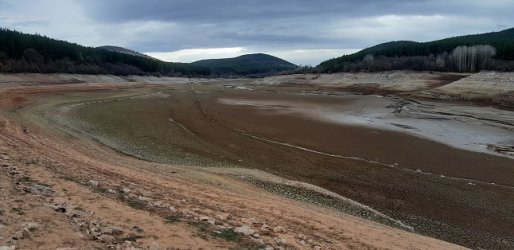
The new Prosecutor General Ivan Geshev announced via the institution’s press office that he will personally oversee the indictments regarding the water crisis in Pernik.
Back in November, just after the local elections were over, the town of Pernik woke to wаter restrictions. It was quickly revealed that the water levels of the main water reservoir, which supplies the town and the region, had reached a critical low. Today the reservoir is almost empty.
Over the weeks following the restrictions, both ministers relevant to the problem have denied any wrongdoing. Both Ecology Minister Neno Dimov and Regional Minister Petya Avramova firmly reject any blame or involvement. Dimov even told reporters that the Studena reservoir’s water has been illegally redirected to Radomir “for years.” The local prosecutor in charge of the case, however, declared the two ministers should be indicted. But only the Specialized Prosecutor’s Office can indict high level officials so Krassimira Mincheva transferred the case there. The Specialized Court and prosecution are not exactly known for efficiency or success in trying cases of high-level officials’ crimes and misdemeanors.
The Prosecutor General’s press release yesterday, however, does not mention the ministers: only “local and regional administration officials.”
Meanwhile, water engineers from Sofia Water published an assessment of the water agency in Pernik, concluding in short that the institution is understaffed, undermanaged, lacks supplies and is generally in a devastating state.
The new mayor of Pernik Stanislav Vladimirov announced about a month ago that the water level in Studena has been steadily falling for much longer than reported, at least six months. In his words, the authorities not only knew about the coming crisis, but in effect hid the severity of the situation. The restrictions were implemented only after the elections but according to him they were well overdue and should have been put in place months before.
Even PM Boyko Borissov threw under the bus his fellow party members from Pernik who managed the reelection campaign of now-former GERB mayor Vyara Tserkovska by stating that they had concealed the water crisis. Tserovska failed to win a second term, regardless, but told reporters after the fact that she had done a lot for securing good water management throughout her term. In particular, she cited a ban her administration implemented for drinking water to be used to water gardens. The measure was in place but reportedly not enforced: no one controlled whether or not people followed it, nor did anyone sanctioned violations.
Pernik announced a state of emergency before Christmas, after 40 days of water restrictions. The state of emergency will be extended at least until the end of January, while the restrictions will continue at least until March.
Pending indictments notwithstanding, in the end hardly anyone will emerge responsible for leaving an entire city in 2019 without water. PM Borissov blames the water agency, the water agency blames the local administration, the local administration blames the national, and it blames everybody else. Judging from the Prosecutor’s Office’s past success in cases involving officials, their indictments will serve to close the case and move on. Meanwhile citizens are queuing at the mineral water spring with dozens of ten-quart tubes, while the water is rapidly closing in on levels where the water will cease altogether. And, as in many other cases in Bulgaria, the government’s actual crisis and risk management abilities extend to hoping for favorable weather conditions.
mediapool.bg

 България | Съб, 16 Ноем 2024г. 20:33ч. | Чакъров ще оспори местенето на централата на ДПС в София
България | Съб, 16 Ноем 2024г. 20:33ч. | Чакъров ще оспори местенето на централата на ДПС в София